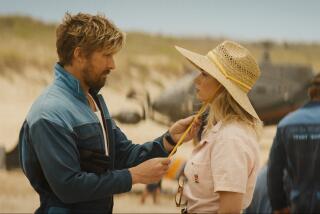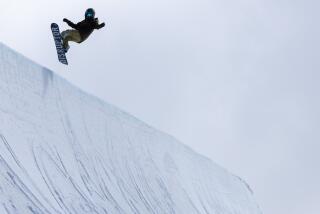Legend of the Fall
- Share via
FLACHAU, Austria — The sturz, that’s what he calls it, the otherworldly high-speed crash at the 1998 Winter Olympics that cemented Hermann Maier’s reputation as The Herminator. It was a wipe-out that would have, should have maimed a lesser man. Maier got up. A few days later, he won Olympic gold. Then, a few days after that, a second gold medal.
Now there has been another sturz, another crash. This one was on a motorcycle, last summer, only a few kilometers from here, Maier’s hometown. His right leg was mangled. He lifts his pants to show off the scar down by his ankle, a nasty, ugly thing the size and shape of a lopsided baseball, the stitches running up, down and around.
A lesser man would have no hope of skiing in the Salt Lake City Winter Olympics. The Games begin 50 days from today.
Already, though, the 29-year-old Maier walks without a limp. With luck, he says, next week he will strap on his skis for the first time since the accident last August. “It’s a little bit light on time,” he says, grimacing slightly as he slides the pants back down over the scar. “I give it my best.”
Thus the stage is set for what promises to be one of the most compelling dramas of the Salt Lake Games: The Herminator--will he be back?
“If it is humanly possible, he will be back,” said The Terminator himself, Arnold Schwarzenegger, who since the 1998 Nagano Olympics has become good friends with Maier.
Doubters need only check the tape from Nagano. Maier, though glad to speak in horrific detail about the second sturz, immensely dislikes describing the first. But it was perhaps the signature moment of the 1998 Games, a scene that catapulted him into superstardom and the company of the likes of Schwarzenegger.
Beforehand, Maier was known and respected mostly by ski insiders--as much for his extraordinary story as his ability.
Maier’s parents ran a ski school in Flachau, a 750-year-old village of stucco-walled ski chalets and not much more. He learned to ski at 3. At 6, he was winning races.
But Maier was overlooked in Austria, where the most promising skiers are identified at 10 or 12 and lavished with the best coaches, the best training. He was simply too scrawny. He didn’t grow until late--at 16, he weighed only 110 pounds--and bulked up to 180 pounds only when he was 20, after a six-month stint in the Austrian military during which he lifted weights and, so the story goes, ran through the Alps with a grenade launcher on his back.
In the summers, he worked as a bricklayer. In the winters, he taught skiing; before work, at dawn, he would ski a slalom course he’d designed for himself.
“What makes him so good as a ski racer is that he has unbelievable talent and he has a specific love to work out,” said Herwig Demschar, a former Austrian and U.S. ski team coach who now is Alpine skiing director for the Salt Lake Games. “Sometimes you run into athletes with unbelievable talent but they are lazy. Then you have hard-working guys who have no talent. He has both--a gifted ski racer who has unbelievable touch and loves to work out.”
In January, 1996, he was just another ski instructor when the World Cup giant slalom race was held in Flachau. Maier was asked to be a “forerunner,” to go down the course before the race to help officials check it out. Maier’s time on the run ended up being one second behind Alberto Tomba, the multiple Olympic medal winner who was then considered the best skier on the World Cup circuit.
A few weeks afterward, Maier won a spot on the Austrian team. A year later, in his first World Cup downhill, at Chamonix, France, he fell and broke his left arm; skiing with the cast a few weeks after that, he won his first World Cup race, a super giant slalom at Garmisch, Germany.
By 1998 he was beginning to dominate. On the circuit, he was known at first as the Beast. Then, aptly, The Herminator.
He seemed freakishly indestructible.
He was relentless.
Aloof.
And, besides, built like a truck.
Then came the Olympic downhill in Nagano.
Because of bad weather, the race was pushed back several days. It went off on a Friday. Friday the 13th.
Pushing it, as usual, skiing perhaps 65 or 70 mph, Maier lost an edge around the seventh gate. Suddenly, he was flying.
Maier flew for 50 meters, for a breathtakingly long moment, seemingly suspended in mid-air, windmilling his arms, now his left arm down, right arm up, the tip of his right ski up by his head and the white Austrian lion on the crown of his red helmet.
Then he hit. Hard. He did three somersaults. He crashed through two snow fences and went beyond another. Finally, he came to rest, face first, in deep, soft snow.
After a few motionless moments, Maier got up. He stood up, brushed off the snow, wagged a finger to show the folks back home he was OK, retrieved his skis, clicked back in and skied down the mountain, shooing away worried officials.
Instantly, the video of the crash became a highlight loop. The International Olympic Committee has since seized upon it for an advertising campaign touting athletic bravery and courage.
Maier would make light of the affair. “I saw blue light but I didn’t see Lufthansa,” he said the next day.
Such jokes mask skiing’s essential danger--and the fact that the Austrian ski team has endured several deaths in recent years, on the slopes and off.
Ulrike Maier, no relation, was killed when she hit a timing post in a World Cup downhill in Germany in 1994, two weeks before the Lillehammer Olympics, where she was expected to star. Maier’s idol, former world champion Rudy Nierlich, died in an auto accident.
A reminder of just how dangerous world-class downhill skiing can be came earlier this month. Like Maier in 1998, Switzerland’s Silvano Beltrametti crashed through the safety netting in mid-course in a race in a World Cup race in Val d’Isere, France; he slammed into a mattress-covered pillar with such force that his helmet was split open. Beltrametti is now paralyzed from the chest down.
After Maier’s Nagano wipe-out, Schwarzenegger--who, like Maier, is from a little town in Austria--called him in Japan to offer encouragement.
“I said, ‘Don’t worry about the accident,”’ Schwarzenegger recalled. “[Three] days later, he was back. He became The Herminator. The Terminator always says, ‘I’ll be back.’ He showed in real life he was back. It’s rare to see that kind of courage and confidence.”
He also said of Maier, “He is tough physically, tough mentally, tough psychologically. Outside, he is like steel. So is his character and his will. The reason I say steel is, the more you temper with it, pound it like a samurai stone, the more layers of fire and pounding it goes through, the remolding, the stronger it gets. That’s what he reminds me of.”
Maier has said repeatedly he never gave a thought to not competing in that first race after the downhill, the super-G. He won easily, in 1:34.82, more than six-tenths of a second ahead of the co-silver medalists, Didier Cuche of Switzerland and Hans Knauss of Austria.
American Tommy Moe, the 1994 Olympic downhill champion, said afterward of Maier, “He gets that crazy-eyed look, like a barbarian straight out of the woods of Austria.”
Added Maier’s girlfriend at the time, Petra Wechselberger, “Maybe he really is an alien, I don’t know.”
Three days later, Maier won the giant slalom. Second was teammate Stephan Eberharter. “I’m still sorry about my downhill, but I’m very happy about these two medals,” Maier said then.
Since then, Maier became--without question--the best skier in the world. Three of the past four years, he won the World Cup overall title.
This past summer, he had what his handlers call a great training camp in Chile. Then he flew home to Austria.
On Aug. 24, two days after coming back, Maier was on his motorcycle, on the road between Flachau and Obertauern, site of Austria’s Olympic training center, when a red Mercedes ahead of him made a sudden left turn. There was no time to stop; the bike slammed into the car.
Maier was thrown into a ditch. He said, “The first time I saw my leg, it was open. There was blood. The bone was out. It was very difficult for me.”
The accident took place at 7:30 p.m. By chance, it happened directly in front of a medical clinic where the doctors know Maier well; he was in a helicopter within minutes and on an operating table in Salzburg, the nearest big city, by 8:30 p.m.
Surgeons inserted screws and a titanium rod to repair his broken tibia. They grafted skin from his left arm onto his right shin.
In Maier’s immediate circle, fear was mixed with disbelief. Maier’s younger brother, Alex, a world-class snowboard racer, was driving home from a race last November when a huge chunk of ice came flying off the roof of the truck ahead of him. He hit the brakes and slammed into the truck and a highway divider. Alex Maier and his two passengers were able to walk away; the younger Maier is a strong candidate for an Olympic medal in Salt Lake.
Immediately after the motorcycle and Mercedes tangled, a nation wondered if the same could be said of the older brother. A Salzburg newspaper published photos of Maier’s X-rays, before and after surgery, on the front page.
As soon as he was released from the hospital, meantime, Maier got back on the stationery bike and started lifting weights.
The right leg seems to be healing. The worry, he and others say, is the left leg. Maier’s pelvis was badly bruised in the crash and for several days doctors worried about tennis-ball sized blood clots; the bruising, they say, has caused nerve damage in his left leg.
But, doctors say, because the patient is Maier, anything is possible.
“I’m serious to say he can start in Salt Lake City,” said his orthopedic surgeon, Artur Trost.
Because of Maier’s attitude, his coaches say, everything is possible.
“His feeling is he will ski,” said Heinrich Bergmuller, director of the Obertauern training center.
If Maier can get back on skis, the next issue will be whether he can regain his form and, if so, how quickly. He demurs. “I have to train,” he says simply, shrugging his shoulders.
Schwarzenegger--who a few days ago was in a motorcycle accident of his own, fracturing some ribs in a spill in Santa Monica--remains confident in Maier’s future.
After Maier’s August sturz, Schwarzenegger sent flowers, then followed up with a phone call.
“I wished him good luck,” Schwarzenegger recalled. “He said, ‘I’ll be back.”’
More to Read
Go beyond the scoreboard
Get the latest on L.A.'s teams in the daily Sports Report newsletter.
You may occasionally receive promotional content from the Los Angeles Times.






